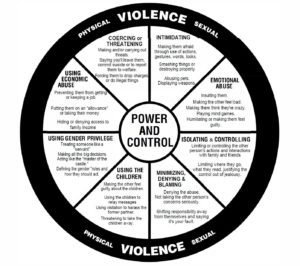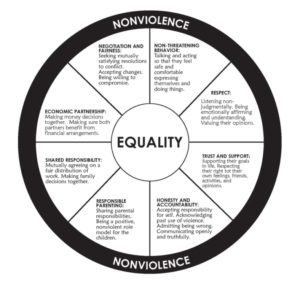What is Domestic Violence?
Domestic violence is an ongoing pattern of intimidation, violence, controlling, and/or terrorizing behaviors by one person over another, in order to control and have power over another person.
Domestic violence can happen to anyone regardless of age, race, sexual orientation, educational attainment, or socioeconomic status.
Economic/Financial Abuse – Financial or economic abuse is a way to control the victim through their access to money. Some examples might be denying the victim access to money or preventing them from keeping or maintaining a job. The abuser might also spend the money needed for rent or food on nonessential items.
Using Children and Pets –The abuser controls the victim by harming or threatening to harm children or pets.
Reproductive Coercion – The abuser controls the victim by denying the victim control over their own reproduction. Some examples might be the abuser refusing to wear a condom or denying the victim access to birth control. Reproductive coercion often leads to unintended pregnancies for the victim.
Coercion and Threats – The abuser controls the victim by coercing them into doing things against their will or by threatening them such that they relent to the abuser’s wishes. Some examples might be threatening to commit suicide if the victim does not do what they say, or making a false report to the authority, or making the victim do illegal activities.
- Emotional Abuse – The abuser puts the victim down, humiliates the victim, and calls the victim names.
Physical Abuse – The abuser controls the victim through any act of violence or by restraint. This might include pushing, shoving, strangling, hitting, kicking, or physically preventing the victim to move or leave the premises.
Spiritual Abuse – The abuser denies the victim the ability to attend religious services or forces the victim to break the tenets of their religion.
- Sexual Abuse – The abuser controls the victim through sexual assault or rape.
Isolation – The abuser controls the victim by preventing them from seeing family or friends and limiting their social safety net.
- Stalking – The abuser follows the victim, checks the mileage on their car, tracks them through their smartphone, or monitors their calls.
- Sexual Identity – The abuser might control the victim by threatening to “out” them to their family and friends.
You may have a friend, relative, colleague, or neighbor who is being abused.
You may have witnessed the violence, heard it, seen the physical signs of it, or merely suspected for various reasons.
What should you say?
-
I am worried about the safety of your children and your pets.
-
You deserve better than this.
-
I am worried about your safety.




